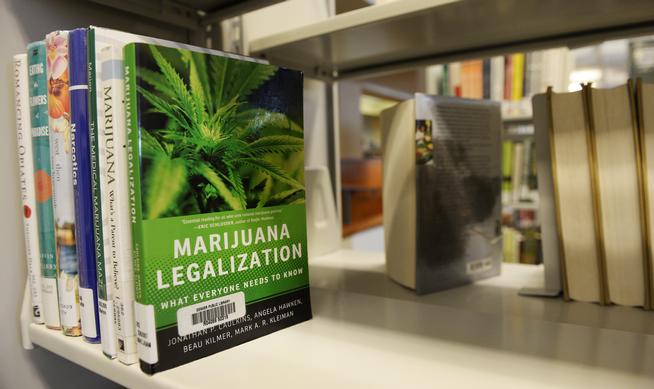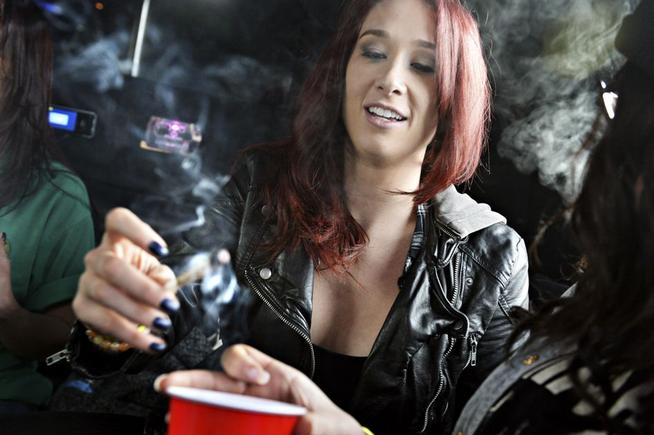Like countless commuters in Denver’s urban core, Marty Otañez can’t help but smell the pot smoke as he rides to work along the Cherry Creek bike path downtown.
“A couple years ago it was only under the bridge at Colfax and Speer,” Otañez said of the clouds emanating from public tokers. “Now it’s pretty much every 100 meters.”
Increased pot smoke swirling around city streets and parks is one of the most recognizable effects of Amendment 64 — which legalized the recreational use and sale of marijuana in Colorado — particularly since public consumption remains illegal.
At concerts, from Red Rocks Amphitheatre to the Pepsi Center, it’s something of a foregone conclusion, no matter how aggressively the staff attempts to prevent it. (Promoter AEG Live Rocky Mountains, which frequently books shows at Red Rocks and the Pepsi Center, declined requests for comment.)
Year in Review: 2015
Local laws: Pot-selling small towns build identity near Colorado cities that ban sales
Unbalanced cannabis landscape: Denver’s pot businesses mostly in low-income, minority neighborhoods
A new calling: Accidental entrepreneurs find skills in high demand as marijuana matures
Normalization: The subtle mainstreaming of cannabis in Colorado is happening everywhere
On the road: A slow shift on working marijuana into alcohol-centered road safety
Kids and cannabis: Marijuana use in Colorado schools still unclear, prevention on the rise
NEW: Get podcasts of The Cannabist Show.
Subscribe to our newsletter here.
Watch The Cannabist Show.
But there are smaller, less in-your-face ways that show how marijuana has become woven into the fabric of daily life in Colorado.
Otañez, a cultural anthropology professor at the University of Colorado at Denver, teaches a class titled Cannabis Cultures. His 13 students examine different aspects of legal weed, from the social effect of decriminalization to using cannabis tea as a stress reliever.
“We’re really well placed to see culture in the making here,” Otañez said. “It’s this pioneering moment between normalization and the residual effects of prohibition. All of Denver is a laboratory.”
Pot-related books plentiful
The sheer omnipresence of cannabis culture — from the dozens of green-emblazoned pot-shop signs around town to flashy, colorful ads for vape pens and bongs — has worked to erode the novelty and stigma of smoking pot.
But so has watching the rise of marijuana-related titles at public libraries — the bastions of approved knowledge for the masses.

“We’re seeing more interest in quality, vetted books about cooking, growing and social issues surrounding marijuana,” said Chris Henning, marketing manager for Denver Public Library system, citing a 35 percent circulation increase in pot-related titles over 2014.
The Denver Public Library bought double the number of marijuana books in 2015 over 2014, he said, which is why “The Cannabis Kitchen Cookbook” recently showed up on the featured shelf at the Woodbury branch in the Highland neighborhood.
“We’ve gotten no complaints about it,” said an employee, who asked not to be identified. “Mostly (complaints) come from sex stuff, religious stuff. But marijuana? We were sort of expecting some and it never happened.”
Useful weed resources
Strain reviews: Check out our marijuana reviews organized by type — sativas and sativa-dominant hybrids, ditto with indicas.
NEW: Get podcasts of The Cannabist Show.
Subscribe to our newsletter here.
Watch The Cannabist Show.
On the other end of the spectrum, the erosion of stereotypes has created opportunities in high-risk healthcare, said Adrienna Lujan, executive director of the Denver nonprofit Geronimo Enterprises.
“Now that cannabis is legal, people don’t have to live in some kind of shame or stigma, which allows us to explore alternatives,” said Lujan, a certified addictions counselor who trains community health workers in HIV and intravenous drug-addict treatments.
Those alternatives include using marijuana as a withdrawal buffer for heroin, Oxycontin and crack.
“From a public health standpoint, it’s not just a replacement for another addiction but a way to reduce the harm of it,” she said. “Legalization has made people feel safer talking about that even being an option, not only for general public but service providers as well.”
“Trying to pave a path”
The normalization of pot culture is a quest that goes back decades, seen most notably in the name of the country’s oldest, largest pro-pot nonprofit, NORML (National Organization for the Reform of Marijuana Laws), which was founded in 1970.
But while “normal” means something different to everyone, Colorado has already made room for a pot-smoking Bible-study group in Centennial ( profiled in a recent New York Magazine article), stoner poker nights, cooking classes, dinner parties and even Colorado Symphony Orchestra events.
“As public acceptance changes and federal laws change, this need to hide use is fading,” said Brett Davis, CEO of Denver startup Social MMJ.

Davis has organized a Sushi and Joint Rolling class, Munchie Crawl (a pot-pub crawl) and, most recently, a Tacky Light Tour that allows people to smoke on a tour bus while surveying Denver’s kitschiest Christmas displays.
The current state of pot consumption — which stipulates it can only be used on private property with the owner’s consent — complicates normalization, but also provides opportunities for businesses such as his.
“People will pay $60 or $70 to attend an event like the (Tacky Light) tour because there’s nowhere else to smoke socially,” Davis said. “We’re trying to pave a path here. We’re not seeing the increase of traffic accidents, fatalities, robberies or all these other fears people had about legalizing pot, and that’s opening this door.”
While industry groups and marketing firms work to sell cannabis to skeptics and newcomers, seeing Colorado’s culture in action is a deciding factor for many visitors.
“I was shocked,” said Nancy Bena, of Baltimore, who spent her 69th birthday in Denver last month after buying a package deal from Denver-based My420Tours. “I was expecting a party atmosphere, and people walking around town all out of it, but it was very professional.”
Pursuing social pot use
Other legal states: Social pot use a riddle for Seattle as well as in Denver
Looking to the future: Colorado lawmaker predicts ‘we will see cannabis clubs similar to bars’
NEW: Get podcasts of The Cannabist Show.
Subscribe to our newsletter here.
Watch The Cannabist Show.
My420Tours leads anywhere from 120 to 200 visitors per week to grow operations and other cannabis businesses, allowing them to discretely sample product (on a private bus) and connecting them with hotel rooms.
Danny Schaefer, chief operating officer, has watched the business double quarterly and expects My420Tours’ revenues to exceed $2 million this year.
“It’s still a novelty to people who aren’t from here,” Schaefer said.
However, visiting the Mile High City shows that cannabis is integrated into daily life here, he said.
Schaefer even cited a handful of people who, within days of their trip, decided to buy a home in Colorado to bask in the legal marijuana culture.
Baltimore resident Bena hasn’t gone quite that far. But she is already planning on spending her 70th birthday in Denver.
“I’m taking a plane and flying out as fast as I can,” she said. “Colorado has already done all the groundwork.”
John Wenzel: 303-954-1642, jwenzel@denverpost.com or @johnwenzel
Updated Dec. 29 at 4:15 p.m. The following corrected information has been added to this article: Because of a reporter’s error, the job title for Brett Davis was misreported. Davis is CEO of Denver startup Social MMJ.
